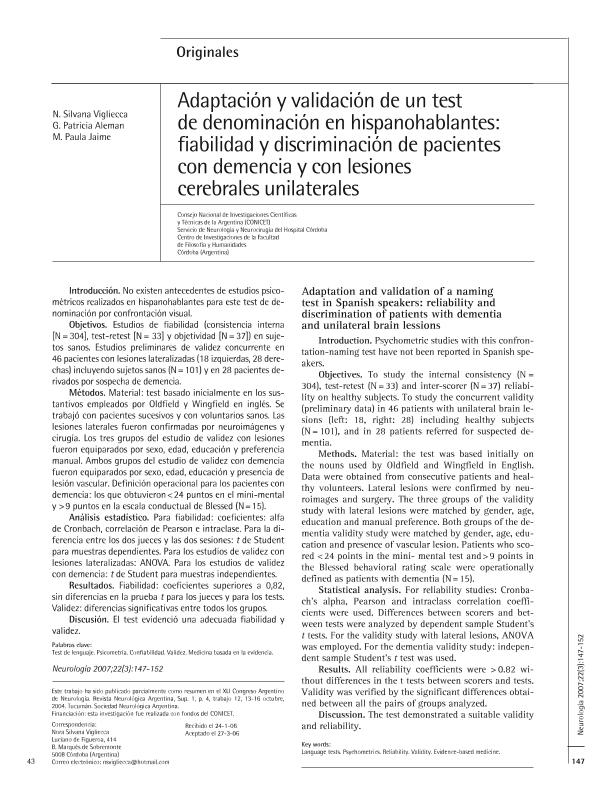Artículo
Introducción. No existen antecedentes de estudios psicométricos realizados en hispanohablantes para este test de denominación por confrontación visual. Objetivos. Estudios de fiabilidad (consistencia interna [N = 304], test-retest [N = 33] y objetividad [N = 37]) en sujetos sanos. Estudios preliminares de validez concurrente en 46 pacientes con lesiones lateralizadas (18 izquierdas, 28 derechas) incluyendo sujetos sanos (N = 101) y en 28 pacientes derivados por sospecha de demencia. Métodos. Material: test basado inicialmente en los sustantivos empleados por Oldfield y Wingfield en inglés. Se trabajó con pacientes sucesivos y con voluntarios sanos. Las lesiones laterales fueron confirmadas por neuroimágenes y cirugía. Los tres grupos del estudio de validez con lesiones fueron equiparados por sexo, edad, educación y preferencia manual. Ambos grupos del estudio de validez con demencia fueron equiparados por sexo, edad, educación y presencia de lesión vascular. Definición operacional para los pacientes con demencia: los que obtuvieron<24 puntos en el mini-mental y >9 puntos en la escala conductual de Blessed (N=15). Análisis estadístico. Para fiabilidad: coeficientes: alfa de Cronbach, correlación de Pearson e intraclase. Para la diferencia entre los dos jueces y las dos sesiones: t de Student para muestras dependientes. Para los estudios de validez con lesiones lateralizadas: ANOVA. Para los estudios de validez con demencia: t de Student para muestras independientes. Resultados. Fiabilidad: coeficientes superiores a 0,82, sin diferencias en la prueba t para los jueces y para los tests. Validez: diferencias significativas entre todos los grupos. Discusión. El test evidenció una adecuada fiabilidad y validez. Introduction. Psychometric studies with this confrontation-naming test have not been reported in Spanish speakers. Objectives. To study the internal consistency (N = 304), test-retest (N = 33) and inter-scorer (N = 37) reliability on healthy subjects. To study the concurrent validity (preliminary data) in 46 patients with unilateral brain lesions (left: 18, right: 28) including healthy subjects (N = 101), and in 28 patients referred for suspected dementia. Methods. Material: the test was based initially on the nouns used by Oldfield and Wingfield in English. Data were obtained from consecutive patients and healthy volunteers. Lateral lesions were confirmed by neuroimages and surgery. The three groups of the validity study with lateral lesions were matched by gender, age, education and manual preference. Both groups of the dementia validity study were matched by gender, age, education and presence of vascular lesion. Patients who scored <24 points in the mini- mental test and>9 points in the Blessed behavioral rating scale were operationally defined as patients with dementia (N=15). Statistical analysis. For reliability studies: Cronbach’s alpha, Pearson and intraclass correlation coefficients were used. Differences between scorers and between tests were analyzed by dependent sample Student’s t tests. For the validity study with lateral lesions, ANOVA was employed. For the dementia validity study: independent sample Student’s t test was used. Results. All reliability coefficients were > 0.82 without differences in the t tests between scorers and tests. Validity was verified by the significant differences obtained between all the pairs of groups analyzed. Discussion. The test demonstrated a suitable validity and reliability.
Adaptación y validación de un test de denominación en hispanohablantes: fiabilidad y discriminación de pacientes con demencia y con lesiones cerebrales unilaterales
Título:
Adaptation and validation of a naming test in Spanish speakers: reliability and discrimination of patients with dementia and unilateral brain lessions
Fecha de publicación:
12/2007
Editorial:
Sociedad Española de Neurologia
Revista:
Neurologia
ISSN:
0213-4853
e-ISSN:
1578-1968
Idioma:
Español
Tipo de recurso:
Artículo publicado
Clasificación temática:
Resumen
Palabras clave:
Evaluación
,
Cognitiva
,
Lateralidad
,
Validez
Archivos asociados
Licencia
Identificadores
Colecciones
Articulos(IDH)
Articulos de INSTITUTO DE HUMANIDADES
Articulos de INSTITUTO DE HUMANIDADES
Citación
Vigliecca, Nora Silvana; Aleman, Gretel Patricia; Jaime, M. Paula; Adaptación y validación de un test de denominación en hispanohablantes: fiabilidad y discriminación de pacientes con demencia y con lesiones cerebrales unilaterales; Sociedad Española de Neurologia; Neurologia; 22; 3; 12-2007; 147-152
Compartir




